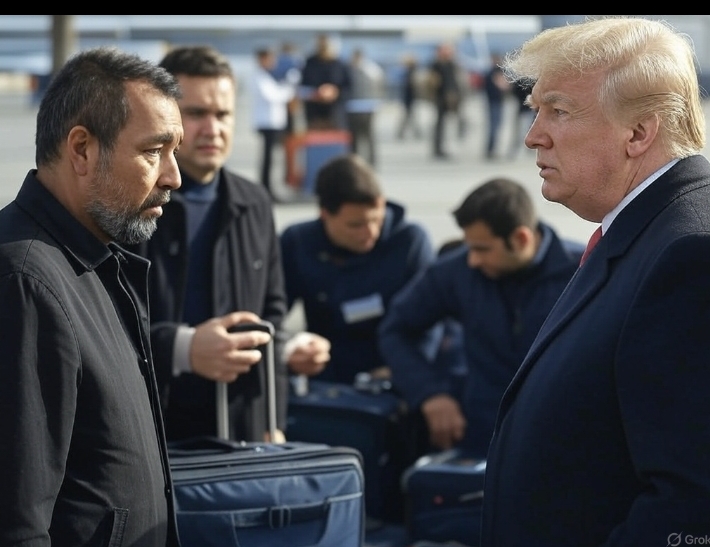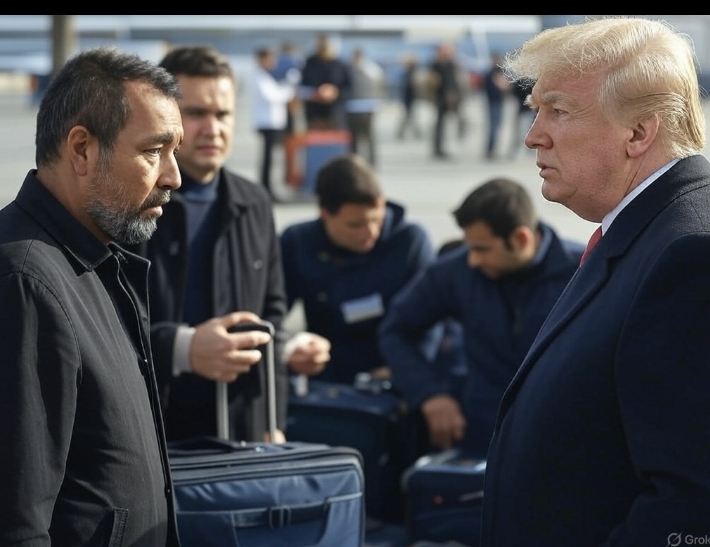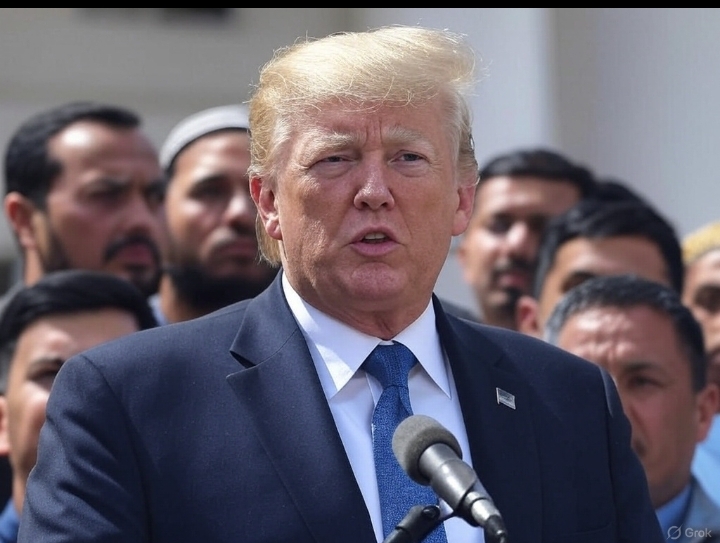CELEBRITY
Shocking News: Trump Administration Cancels Flights of Over 1,000 Afghan Refugees Amid Drug Trafficking..see more details below 👇 👇 👇

Shocking News: Trump Administration Cancels Flights of Over 1,000 Afghan Refugees Amid Drug Trafficking..see more details below 👇 👇 👇
Trump Administration Cancels Flights for Over 1,000 Afghan Refugees Bound for the United States
In a significant policy shift, the Trump Administration has abruptly canceled flights scheduled to transport over 1,000 Afghan refugees to the United States. This decision, announced on March 20, 2025, has sparked widespread concern among humanitarian organizations, refugee advocates, and lawmakers, raising questions about the future of U.S. resettlement programs and the fate of those fleeing Afghanistan’s ongoing crises. The move reflects a broader stance on immigration that characterized Donald Trump’s first term and appears to signal a return to restrictive policies as his administration reasserts control.
Background: Afghan Refugee Resettlement in the U.S.

Since the U.S. withdrawal from Afghanistan in August 2021, tens of thousands of Afghans who assisted American forces—or who faced persecution under the Taliban—have sought refuge in the United States. Programs like the Special Immigrant Visa (SIV) and humanitarian parole initiatives were established to facilitate their resettlement. By early 2025, the Biden Administration had resettled over 90,000 Afghans, with thousands more in the pipeline awaiting final approval and transportation.
These efforts were part of a bipartisan commitment to honor America’s promises to its Afghan allies. However, the process has been plagued by bureaucratic delays, security vetting challenges, and logistical hurdles. The group of over 1,000 refugees affected by the recent cancellations had already cleared extensive screening processes and were poised to board flights from temporary staging areas in countries like Qatar, the United Arab Emirates, and Germany.
The Cancellation: What We Know
Details surrounding the Trump Administration’s decision remain sparse, but official statements indicate the cancellations stem from a broader review of immigration and refugee policies. A spokesperson for the Department of Homeland Security (DHS) stated, “The administration is committed to ensuring that all entries into the United States align with national security priorities and economic interests.” The spokesperson declined to elaborate on whether the cancellations are temporary or part of a permanent policy shift.
Sources within the administration, speaking anonymously, suggest that President Trump ordered an immediate halt to the flights shortly after taking office in January 2025. The decision reportedly reflects his long-standing skepticism of refugee programs, which he has previously criticized as potential vectors for terrorism and economic strain. During his 2024 campaign, Trump repeatedly vowed to “secure the border” and limit inflows of migrants and refugees, a promise that appears to be taking shape with this move.
The affected refugees—many of whom are families with young children—were informed of the cancellations just hours before their scheduled departures. Aid workers on the ground report scenes of confusion and despair, with some refugees having sold their possessions or abandoned homes in anticipation of their new lives in the U.S.
Humanitarian and Political Reactions
The cancellation has drawn sharp criticism from humanitarian groups and Democratic lawmakers. The International Rescue Committee (IRC) condemned the decision as “a betrayal of our Afghan allies who risked their lives for us.” IRC President David Miliband called on the administration to reverse the cancellations, warning that leaving these refugees in limbo could expose them to heightened risks, including deportation to Afghanistan, where the Taliban remains in power.
Senate Majority Leader Chuck Schumer (D-NY) issued a statement accusing the Trump Administration of “turning its back on America’s moral obligations.” He pledged to introduce legislation to expedite Afghan resettlement and counter what he described as “xenophobic overreach.” Meanwhile, some Republican figures have praised the move. Senator Tom Cotton (R-AR) tweeted, “America First means prioritizing our citizens, not opening the floodgates to unvetted refugees.”
Public opinion appears divided. A recent Gallup poll conducted in February 2025 showed that 54% of Americans support continuing Afghan resettlement programs, though support drops significantly among self-identified conservatives, with only 32% in favor.
Implications for Afghan Refugees
For the over 1,000 refugees directly impacted, the cancellations mean prolonged uncertainty. Many are currently housed in temporary facilities in third countries, where resources are stretched thin. These “lily pad” locations were never intended for long-term stays, and aid organizations warn that conditions could deteriorate if the U.S. does not resume flights soon.
The broader Afghan diaspora in the U.S. has also expressed alarm. Community leaders report that families are frantic, unable to contact loved ones stuck overseas. “These are people who stood by our soldiers, who translated for our diplomats,” said Farooq Ahmadzai, president of the Afghan-American Community Organization. “To abandon them now is unconscionable.”
Legal and Policy Context
The Trump Administration’s authority to cancel the flights falls under the executive branch’s broad discretion over immigration policy. The Refugee Act of 1980 allows the president to set annual refugee admission ceilings in consultation with Congress, but no formal cap for fiscal year 2025 has been announced yet. Legal experts suggest that the administration could face challenges if the cancellations violate existing commitments to SIV holders, who are granted specific rights under U.S. law.

This decision also aligns with Trump’s previous actions on refugee policy. During his first term, he slashed the refugee admissions ceiling to a historic low of 15,000 in 2019, down from 110,000 under President Obama. The Biden Administration had raised the cap to 125,000 annually, a target the Trump team appears poised to dismantle.
Looking Ahead
The cancellation of these flights raises larger questions about the Trump Administration’s immigration agenda. Will this mark the beginning of a broader rollback of refugee programs? How will the U.S. balance its national security concerns with its humanitarian commitments? And what precedent does this set for future crises requiring American intervention?
For now, the over 1,000 Afghan refugees remain in limbo, their dreams of safety and stability in the United States deferred indefinitely. As the administration conducts its policy review, pressure is mounting from both sides—advocates demanding compassion and hardliners insisting on restriction. The outcome will likely shape not only the lives of these refugees but also America’s reputation as a refuge for the persecuted.
As this story develops, the world watches closely, waiting to see whether the U.S. will open its doors once more—or lock them shut.
In a dramatic and controversial move, the Trump Administration has canceled flights scheduled to bring over 1,000 Afghan refugees to the United States, citing concerns over drug trafficking. The decision, announced on March 20, 2025, has reignited debates over immigration policy, national security, and America’s obligations to its wartime allies. This action marks a significant escalation in the administration’s broader immigration crackdown, leaving refugees, advocates, and policymakers grappling with its implications.
The Context: Afghan Refugees and U.S. Policy
Since the U.S. military withdrawal from Afghanistan in August 2021, the United States has worked to resettle tens of thousands of Afghans who supported American efforts during the 20-year war or who faced persecution under Taliban rule. Through programs like the Special Immigrant Visa (SIV) and humanitarian parole, over 90,000 Afghans had been resettled by early 2025 under the Biden Administration. The affected group of over 1,000 refugees had completed rigorous vetting processes and were awaiting transport from staging countries such as Qatar, the UAE, and Pakistan.
The Trump Administration, which assumed power in January 2025, has prioritized stringent immigration controls, echoing policies from Trump’s first term. During his 2024 campaign, Trump repeatedly emphasized national security and economic protectionism, pledging to halt what he described as unchecked inflows of migrants and refugees. The cancellation of these flights appears to be a concrete step toward fulfilling that promise, with a specific focus on curbing potential drug trafficking risks.
The Decision: Drug Trafficking as the Stated Rationale:
According to administration officials, the flight cancellations stem from intelligence suggesting that some Afghan refugees might be linked to drug trafficking networks. A senior official from the Department of Homeland Security (DHS), speaking on condition of anonymity, stated, “We have credible evidence indicating that certain individuals within this cohort could pose a risk of facilitating the movement of illicit narcotics into the United States. This administration will not allow our borders to become a gateway for drugs.”
The U.S. has long been concerned about Afghanistan’s role as a global hub for opium and heroin production, a trade that flourished under Taliban influence. However, specific details about the alleged connections between these refugees and drug trafficking remain scarce. The administration has not publicly released evidence tying the canceled group—many of whom are families, former interpreters, or military allies—to such activities, prompting skepticism from critics.
The refugees in question had already undergone extensive background checks, biometric screenings, and interviews, a process widely regarded as one of the most thorough in U.S. immigration policy. This raises questions about the timing and basis of the administration’s claims, with some suggesting the drug trafficking rationale may serve as a pretext for broader immigration restrictions.
Impact on Refugees
The immediate consequences of the cancellations are profound. Over 1,000 Afghan refugees, including women, children, and elderly individuals, are now stranded in temporary facilities in third countries. Many had sold their belongings, left jobs, or abandoned homes in anticipation of starting anew in the U.S. Aid workers report scenes of anguish and uncertainty, with families left without clear answers about their future.
One affected refugee, a former interpreter for U.S. forces who requested anonymity for safety reasons, shared his frustration: “I risked my life for America, and now they say I’m a drug smuggler? I’ve waited years, passed every test, and still I’m stuck here with my children, not knowing what comes next.” His story reflects a broader sentiment among those impacted—betrayal by a nation they once aided.
Temporary staging countries like Pakistan, already hosting thousands of Afghan refugees, face mounting pressure as delays stretch resources thin. Humanitarian organizations warn that prolonged limbo could expose these individuals to deportation risks or exploitation by criminal networks—the very outcomes the U.S. claims to prevent.
Reactions: Outrage, Support, and Debate
The decision has sparked a firestorm of responses. Humanitarian groups and refugee advocates have decried it as a baseless smear against vulnerable people. The International Rescue Committee (IRC) issued a statement calling the cancellations “a reckless abandonment of America’s moral duty,” arguing that linking refugees to drug trafficking without evidence undermines the integrity of the vetting process. “These are people who’ve been screened more thoroughly than almost any other entrants to the U.S.,” said IRC spokesperson Sarah Gomez. “To paint them as criminals is unjust and dangerous.”
Democratic lawmakers have echoed these sentiments. House Minority Leader Hakeem Jeffries (D-NY) accused the administration of “weaponizing unfounded fears to justify cruelty,” pledging to push for oversight and legislative action to restore resettlement efforts. Conversely, some Republican figures have rallied behind the move. Representative Marjorie Taylor Greene (R-GA) tweeted, “Drugs kill Americans every day. If there’s even a chance these refugees are involved, we can’t take the risk. Trump’s doing what Biden never had the guts to do.”
Public opinion remains polarized. A March 2025 Pew Research poll found that while 51% of Americans support Afghan resettlement in principle, concerns about security and economic impacts resonate strongly with Trump’s base, where only 29% favor continued admissions.
Policy and Legal Dimensions:
The administration’s authority to halt the flights rests on the president’s broad powers over immigration and border security, reinforced by the Refugee Act of 1980, which allows annual refugee caps to be set in consultation with Congress. No formal cap for 2025 has been announced, but the drug trafficking justification introduces a new layer to the policy debate. Legal experts note that if the cancellations disproportionately affect SIV holders—legally entitled to resettlement—lawsuits could follow.
This move aligns with Trump’s first-term policies, which saw refugee admissions drop to a record low of 15,000 in 2019. The Biden Administration had raised the ceiling to 125,000, a target now in jeopardy. Critics argue that the drug trafficking claim could set a precedent for arbitrarily blocking other refugee groups, undermining decades of bipartisan support for resettlement programs.
Broader Implications:
The cancellations signal a potential paradigm shift in U.S. refugee policy, with drug trafficking emerging as a focal point in the administration’s immigration narrative. Afghanistan’s opium trade, which accounts for roughly 85% of global heroin supply according to UN estimates, has long been a national security concern. Yet, linking it to refugees—many of whom fled the very regime profiting from that trade—has struck observers as a stretch.
For the stranded refugees, the stakes are existential. Prolonged delays could force some back to Afghanistan, where the Taliban’s grip tightens daily. Others may turn to smuggling routes out of desperation, ironically increasing the risks the administration seeks to mitigate.
Looking Forward:
As the Trump Administration reviews its refugee policies, the fate of these 1,000-plus Afghans hangs in the balance. Will the drug trafficking allegations hold up under scrutiny, or will pressure from advocates and allies compel a reversal? The answers will shape not only these individuals’ lives but also America’s standing as a refuge for those fleeing persecution.
For now, the canceled flights stand as a stark symbol of a deepening divide—between security and compassion, restriction and obligation. As one Afghan refugee put it, “We thought America was our hope. Now, we don’t know what to believe.” The world watches as the administration’s next moves unfold, with the echoes of this decision likely to reverberate far beyond March 200, 2025












